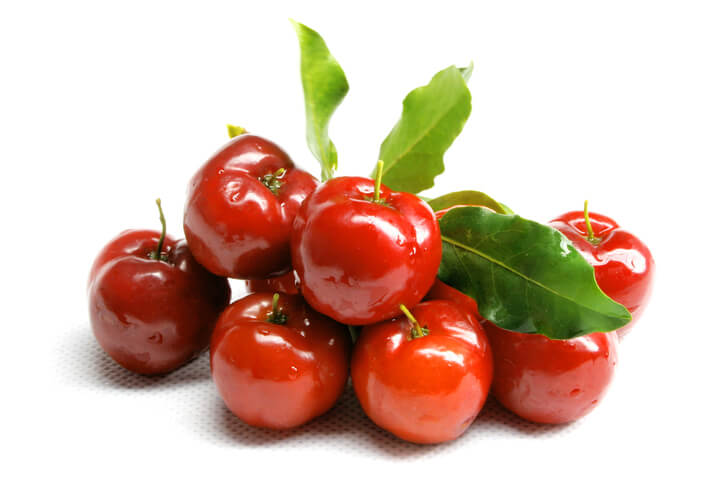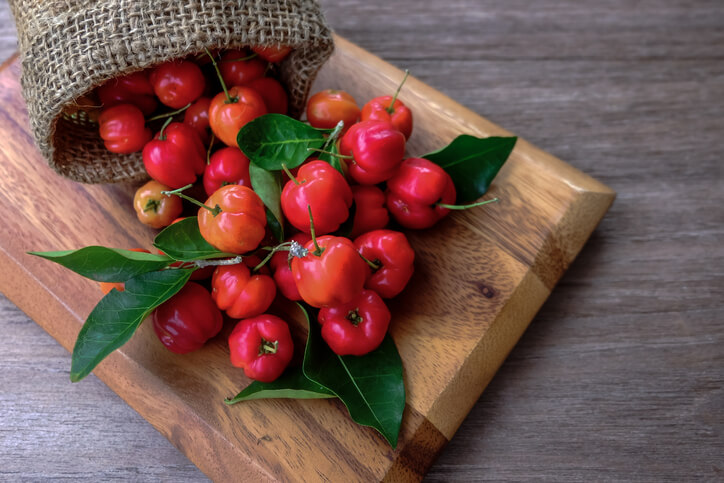Out of All the Cherries, Here’s Why You Should Pick Acerola

Recently, something caught my attention. I was taking a stroll through the supplement aisle at my local health food store and noticed an acerola cherry supplement. I was intrigued, because the bottle of the supplement advertised that it was extremely rich in vitamin C.
Vitamin C is one of the most important nutrients for our health and wellness, and this acerola supplement sparked my curiosity because I am always low in vitamin C.
After years of testing low in this vitamin, despite eating a diet filled with tons of fruits and vegetables, I discovered from genetic testing that I have a defective gene which limits my ability to absorb enough vitamin C from the foods I eat. So I found out I need to include way more vitamin C in my diet than the average recommended daily allowance (RDA). 
I am always on the lookout for foods with very high vitamin C content, and I also utilize IV vitamin drips and injections as ways to increase my vitamin C levels. So needless to say, I went home and did some research on acerola cherry.
Also called “Barbados cherry” and “West Indies cherry,” acerola is a fruit that comes from the Malpighiaceae plant family. Acerola is not an actual cherry, but it is a berry-like fruit. It is a highly perishable fruit, and the more the fruit ripens the more vitamin C it loses.
So it’s not likely that you will find fresh acerola in the produce section of your local grocery store, but you are likely to find it in supplement form as a capsule, chewable, liquid extract or powder.
Acerola is most definitely a vitamin C powerhouse!
To say acerola is rich in the nutrient and antioxidant vitamin C is an understatement.
Let's get some perspective on just how much vitamin C is present in acerola:
- “Averaging close to the camu camu berry, one ounce (28g) of raw acerola contains about 470mg or 783% the Daily Value [of vitamin C],” according to one source.
- Acerola has nine times the vitamin C of a typical orange, according to one report.
- In a study comparing the nutritional value of organic strawberries, persimmons and acerola, acerola proved to be the most rich in vitamin C.
Acerola is a natural source of vitamin C.
“Acerola is attractive to customers who prefer natural products over synthetic ones…,” reports Science Direct.
“In fact, humans can only absorb 50% of synthetic vitamin intake compared to that of natural vitamins.”
Receiving your nutrients from food is always the best route. But if you are like me and need supplementation (in addition to following a healthy, nutrient-rich diet), a natural, good quality supplement may be the way to go. Acerola is said to be one of the best natural sources of vitamin C.
Potential health benefits of consuming an adequate amount of vitamin C.
- Vitamin C may boost your immune system. This vitamin is what many of us refer to as the “go-to vitamin” to improve our immunity and avoid the common cold or cough. This vitamin can also help fight other infections and free radicals. It may even help prevent certain types of cancers.
- Vitamin C may help wounds heal more rapidly. It has long been known that vitamin C is necessary for wound healing. According to the National Institutes of Health (NIH), vitamin C is “crucial for the proper function of the enzyme protocollagen hydroxylase which produces collagen, the primary constituent of the granulation tissue that heals a wound.” And wound healing may require more vitamin C than diet alone can easily provide. So this is why acerola may be a great supplement for some. If you are about to have surgery, talk to your doctor about incorporating acerola into your proactive recovery plan. It may even help prevent diabetic foot ulcers which sometimes lead to medically necessary amputations.
- Vitamin C may help prevent scurvy and accelerated aging. Scurvy severely impacts the immune system. It may cause the gums to bleed easily and become infected. The teeth may become rotten and start to fall out. If not treated, scurvy can be fatal. It has been reported that more than 40% of American adults have an inadequate intake of vitamin C. And while the deficiency may not result in bleeding gums and missing teeth, it might be enough to wreak havoc on our immune systems and make us age faster.
- Vitamin C may help prevent heart disease. The National Institutes of Health (NIH) reports, “Vitamin C is a powerful dietary antioxidant that has received considerable attention in the literature related to its possible role in heart health. Although classical vitamin C deficiency, marked by scurvy, is rare in most parts of the world, some research has shown variable heart disease risks depending on plasma vitamin C concentration, even within the normal range. Furthermore, other studies have suggested possible heart-related benefits to vitamin C taken in doses beyond the minimal amounts required to prevent classically defined deficiency.” If you are at risk of heart disease or currently have it, talk to your doctor about taking an acerola supplement.
- Vitamin C may help keep our skin looking youthful. This vitamin is a major producer of collagen, which is the main ingredient behind the repair of bone and skin tissue, cartilage, ligaments, tendons and teeth. Vitamin C also helps moisturize and nourish the skin, which may increase skin elasticity and may even restore a youthful appearance.
Furthermore, “The high antioxidant content of acerola extracts has contributed to their use for the prevention of age-related diseases such as hypertension and cancer,” reports Science Direct.
If you can, grow your own acerola.
Acerola is drought-tolerant and requires sun and warm temperatures to grow. You will get more nutrients from fresh acerola than you would from a supplement. (Nevertheless, if you do not have access to fresh acerola, you can still reap the benefits from the vitamin C potency in an acerola supplement (especially if you are like me and very prone to vitamin C deficiency)).
In fresh acerola, some of the nutrients present include:
- Calcium. Adequate calcium may also decrease your risk for colorectal cancer. Recent studies confirm high calcium intake is associated with a lower risk of colorectal cancer among both men and women. Maintaining the correct levels of calcium in your system may also reduce the risk of breast cancer.
- Iron. Without adequate iron, your body cannot carry enough oxygen to your vital organs. Low iron levels may also cause you to feel very tired.
- Niacin (vitamin B3). This vitamin is important for our digestive system, skin and nervous system. It helps make sex hormones and stress-related hormones. It also helps improve circulation and suppress inflammation. Niacin is used to treat high cholesterol and is also used alongside other treatments for circulation issues, migraines, dizziness as well as reducing the diarrhea associated with cholera.
- Riboflavin (vitamin B2). Vitamin B2 is important for growth, red blood cell production, proper eyesight and healthy neurological function. B2 is especially important because it affects how our bodies use and absorb iron. B2 also helps the body convert vitamin B6 and folate into usable forms. Furthermore, B2 helps the body break down the three macronutrients -- protein, carbohydrates and fats.
- Thiamine (vitamin B1). This B vitamin plays a big role in energy metabolism. It is important for the growth, development and function of our cells. According to the National Institutes of Health (NIH), humans mainly store B1 in the liver, however, in very small amounts. As a result, we require a continuous supply of this vitamin from our diet.
- Vitamin A. “Vitamin A is critical for vision as an essential component of rhodopsin, a protein that absorbs light in the retinal receptors, and because it supports the normal differentiation and functioning of the conjunctival membranes and cornea,” reports the National Institutes of Health (NIH). Vitamin A also plays a role in immune function, reproduction, cellular communication and maintaining healthy skin and mucous membranes.
Remember, acerola fruit is highly perishable. So if you grow your own, I recommend freezing the fruit. Then you can toss it into a smoothie anytime you want.
Precautions with acerola?
As with any supplement, it is important to seek the advice of a competent healthcare professional before incorporating acerola into your proactive healthcare routine. Too much of a good thing can be bad, and you don’t want to overdo it on the vitamin C. Also know that if taken in large doses, acerola may increase your chances of developing kidney stones.
It’s always best to seek medical advice regarding what foods and supplements you are including in your routine. This is especially true for those with existing health issues or are pregnant or breastfeeding.
And as always, take routine nutrient tests to identify any nutrient imbalances you may have. If an imbalance is discovered, a competent healthcare professional can work with you on making the necessary dietary changes and recommend quality supplements if necessary.
Enjoy your healthy life!
The pH professional health care team includes recognized experts from a variety of health care and related disciplines, including physicians, attorneys, nutritionists, nurses and certified fitness instructors. This team also includes the members of the pH Medical Advisory Board, which constantly monitors all pH programs, products and services. To learn more about the pH Medical Advisory Board, click here.







